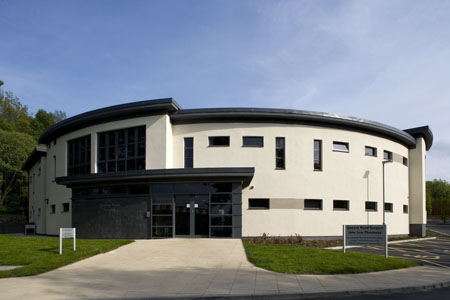
Queens Road Surgery is a modern, purpose-built surgery in the grounds of Shotley Bridge Hospital, with a branch service at Moorside, Consett. It is a 11 GP, five partner surgery with a growing list of 15,800 patients. We use a triage system so that most of the appointment slots are filled by the on-call GP, with assistance from our Nurse Practitioners who also see minor ailments. However, there are also bookable appointments for patients to use.
As well as morning and afternoon surgeries, the Nurse Practitioners run evening surgeries every Tuesday and Thursday until 19.30.
Much of the care home visiting is dealt with by our Nurse Practitioners.
Lows pharmacy is on site at both premises and can provide advice, if required.
Our Doctors
Dr Andrea Clarke
Tuesday, Thursday
Interests: teaching and training, sports/musculoskeletal medicine, joint injections, women's health
Dr Howard Versey
Tuesday, Wednesday, Thursday, Friday.
Interests: teaching and training, minor surgery, musculoskeletal, joint injections.
Dr Jonathan Worthy
Monday, Tuesday, Wednesday, Thursday.
Interests: diabetes, ENT, minor surgery.
Dr Samantha Foster
Monday, Thursday and Friday
Interests: respiratory, mental Health
Dr Ben Hattaway
Tuesday, Wednesday, Thursday and Friday
Interests: teaching and training.
Dr John Brain
Monday, Tuesday, Thursday, and Friday
Interests: General Medicine
Dr Rebecca Mowatt
Monday and Wednesday
Interests: teaching and training
Dr Stephanie Duck
Monday, Wednesday and Thursday
Interests: women’s health, child health, family planning.
Dr Eugenie George
Tuesday and Wednesday
Interests: women’s Health, joint injections, sexual health
Dr John Sinclair
Wednesday and Friday
Interests: General Medicine
Dr Samantha English
Tuesday, Thursday
Interests: women’s health, child health, sexual health, family planning.

Training Registrars
Queens Road Surgery has a well-established history of involvement in training GPs, nurses and medical students. We feel that this enriches the quality of care given to the community by stimulating discussion and debate about new ideas and different practices.
Doctors undergoing training in general practice are referred to as GP registrars, formerly called trainees. All are fully qualified doctors, and some may have extensive hospital experience prior to coming into general practice. Training in general practice takes a minimum of three years from the time of becoming a GP registrar to the time of qualifying to practice as a GP. The three years are divided between one year in selected hospital posts, and a total of two years in general practice. Before becoming licensed to work independently in general practice, all registrars must pass a set of exams to prove their competence.
While undergoing their training, GP registrars are closely supervised and trained by an approved trainer. At Queens Road Surgery we have two approved trainers, Dr Howard Versey and Dr Ben Hattaway, although it is important that the whole surgery team participates in, and supports the process of training.
Patients should be aware that as part of the process of training, it is necessary that GP registrars discuss patients with their trainer. This involves confidentially viewing patients’ medical records. You can expect GP registrars to provide a full range of GP services. If they are not certain about what to do they will ask more senior colleagues for advice.
Dr Kate Mansfield
Dr Susan Lazar
Video Consultations
Patients are also key partners in the training process and the help, support and understanding of patients really is appreciated. One aspect of this process is the video recording of consultations.
This is an important part of training registrars in consultation skills, and in the process of assessment for their exams.
Patients will never be recorded without their consent before starting, and intimate examinations will never be conducted in front of the camera. If a patient subsequently wishes to withdraw their consent after they have been recorded, this wish will be respected, and the recording erased.
Videos will only ever be watched by registrars, trainers, and possibly examiners if the recording is submitted for exam purposes.
Patients should never feel uncomfortable about refusing to be taped if they would prefer not to be, and this will not impact your care in any way
Mental Health Nurse
Kathryn Forster
Advanced Clinical Practitioners
Emma Coates
(ACP/ Nurse Lead)
Jennifer Cuthbertson
Nurse Practitioners
Caroline Carson
Pharmacists
Alex Browne
Clare Moses
Chin Sheng Lee
Nurses
Amie Smith
Caroline Kelly
Heather Farrow
Sophie Beckham
Sandra Telford
Diabetic Nurse Specialist
Angela Pearsall
Nurse Associate
Joanne Mason
Healthcare Assistants
Lorraine Anderson
Paula Hambleton
Tyler Wadrop
Practice Manager - John Blackburn-Wood
Business Manager - Calum Porter
Julie Smith (Admin Manger)
Alison (Prescription Clerk)
Barbara (Prescription Clerk)
Grace (Care Coordinator)
Sharon (Care Coordinator)
Donna (Secretary)
Shirley (Secretary)
Rebecca (GP Assist)
Sue (SPLW)
Rachel Geoghegan (Supervisor)
Alex
Amy
Debbie
Gillian
Julia
Kerryanne
Lily-Jo
Maria
Telephone: 03000 267 979
A health visitor is a registered nurse who has received training particularly related to babies, children and pregnant women. Their role is to provide families with children under five years old with support and advice around the general aspects of mental, physical and social wellbeing.
